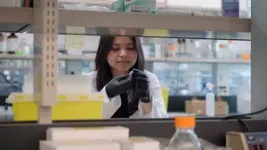(Press-News.org) Attention editors: Embargoed by the journal Nature Chemical Biology until Thursday, May 25 at 11 a.m. easter
Hamilton, ON, May 25, 2023 – Scientists at McMaster University and the Massachusetts Institute of Technology have used artificial intelligence to discover a new antibiotic which could be used to fight a deadly, drug-resistant pathogen that strikes vulnerable hospital patients.
The process they used could also speed the discovery of other antibiotics to treat many other challenging bacteria.
The researchers were responding to the urgent need for new drugs to treat Acinetobacter baumannii, identified by the World Health Organization as one of the world’s most dangerous antibiotic-resistant bacteria. Notoriously difficult to eradicate, A. baumannii can cause pneumonia, meningitis and infect wounds, all of which can lead to death.
A. baumanni is usually found in hospital settings, where it can survive on surfaces for long periods. The pathogen is able to pick up DNA from other species of bacteria in its environment, including antibiotic-resistance genes.
In the study, published today in the journal Nature Chemical Biology, researchers report they used an artificial intelligence algorithm to predict new structural classes of antibacterial molecules, and identified a new antibacterial compound, which they have named abaucin.
Discovering new antibiotics against A. baumannii through conventional screening has been challenging. Traditional methods are time-consuming, costly, and limited in scope.
Modern algorithmic approaches can access hundreds of millions, possibly billions, of molecules with antibacterial properties.
“This work validates the benefits of machine learning in the search for new antibiotics” says Jonathan Stokes, lead author on the paper and an assistant professor in McMaster’s Department of Biomedicine & Biochemistry, who conducted the work with James J. Collins, a professor of medical engineering and science at MIT, and McMaster graduate students Gary Liu and Denise Catacutan.
“Using AI, we can rapidly explore vast regions of chemical space, significantly increasing the chances of discovering fundamentally new antibacterial molecules,” says Stokes, who belongs to McMaster’s Global Nexus School for Pandemic Prevention and Response.
“AI approaches to drug discovery are here to stay and will continue to be refined,” says Collins, Life Sciences faculty lead at the MIT Abdul Latif Jameel Clinic for Machine Learning in Health. “We know algorithmic models work, now it’s a matter of widely adopting these methods to discover new antibiotics more efficiently and less expensively.”
Abaucin is especially promising, the researchers report, because it only targets A. baumannii, a crucial finding which means the pathogen is less likely to rapidly develop drug resistance, and which could lead to more precise and effective treatments.
Most antibiotics are broad spectrum in nature, meaning they kill all bacteria, disrupting the gut microbiome, which opens the door to a host of serious infections, including C difficile.
“We know broad-spectrum antibiotics are suboptimal and that pathogens have the ability to evolve and adjust to every trick we throw at them,” says Stokes. “AI methods afford us the opportunity to vastly increase the rate at which we discover new antibiotics, and we can do it at a reduced cost. This is an important avenue of exploration for new antibiotic drugs.”
Attention editors: High resolution photos with credit information can be downloaded for use at this link: https://photos.app.goo.gl/gwGU2YQ8V4YRsPbN8
END
Scientists use AI to find promising new antibiotic to fight evasive hospital superbug
New process could speed the discovery of other much needed antibiotics
2023-05-25
ELSE PRESS RELEASES FROM THIS DATE:
A metabolic process in cancer cells could unlock a possible treatment for glioblastoma
2023-05-25
A study led by researchers at the UCLA Jonsson Comprehensive Cancer Center has found that targeting a metabolic process in people with a specific genetic mutation could help treat glioblastoma, an aggressive brain cancer.
The genetic alteration — a deletion in a gene called CDKN2A — is present in about 60% of people who have glioblastoma. The mutation causes changes in the way lipids are distributed in cancer cells, which in turn makes the cancer cells vulnerable to being destroyed. The ...
Can sugar and fat influence immune cell responses?
2023-05-25
LA JOLLA, CA—A population of unconventional white blood cells has recently captured the attention of immunologists and clinicians alike. Unlike conventional T cells, which circulate throughout the body in our blood, mucosal-associated invariant T (MAIT) cells are largely found in tissues where they provide immune protection against a broad range of diseases.
MAIT cells are highly abundant in humans. Although they make up only 2 percent of the lymphocytes in blood, MAIT cells account for 10 to 40 percent of lymphocytes in the liver, and they are common in tissues such as lungs. Still, much about MAIT cell biology and clinical function remains unknown.
In ...
County-level maternal vulnerability and preterm birth
2023-05-25
About The Study: The findings of this study using data for 3.6 million births suggest that the Maternal Vulnerability Index (MVI), a novel county-level index designed to quantify maternal vulnerability to adverse health outcomes, was associated with preterm birth even after adjustment for individual-level confounders. The MVI is a useful measure for county-level preterm birth risk that may have policy implications for counties working to lower preterm rates and improve perinatal outcomes.
Authors: Sara C. Handley, M.D., M.S.C.E., Children’s Hospital of Philadelphia, is the corresponding author.
To ...
Deep learning for detection and symptom severity assessment of autism spectrum disorder
2023-05-25
About The Study: In this diagnostic study of 45 children with autism spectrum disorder (ASD) and 50 with typical development, a deep learning system trained on videos acquired using a joint attention–eliciting protocol for classifying ASD versus typical development and predicting ASD symptom severity showed high predictive performance. This new artificial intelligence–assisted approach based predictions on participants’ behavioral responses triggered by social cues. The findings suggest that this method may allow digital measurement of joint attention; however, follow-up studies are necessary for further validation.
Authors: Yu ...
Using AI, scientists find a drug that could combat drug-resistant infections
2023-05-25
CAMBRIDGE, MA -- Using an artificial intelligence algorithm, researchers at MIT and McMaster University have identified a new antibiotic that can kill a type of bacteria that is responsible for many drug-resistant infections.
If developed for use in patients, the drug could help to combat Acinetobacter baumannii, a species of bacteria that is often found in hospitals and can lead to pneumonia, meningitis, and other serious infections. The microbe is also a leading cause of infections in wounded soldiers in Iraq and Afghanistan.
“Acinetobacter can survive on hospital doorknobs and equipment ...
Monkey model offers clues for potential widespread HIV cure in people
2023-05-25
PORTLAND, Oregon -- New animal research is helping explain why at least five people have become HIV-free after receiving a stem cell transplant. The study’s insights may bring scientists closer to developing what they hope will become a widespread cure for the virus that causes AIDS, which has infected about 38 million people worldwide.
Published in the journal Immunity, the Oregon Health & Science University-led study describes how two nonhuman primates were cured of the monkey form of HIV after receiving a stem cell transplant. ...
OU professor leading research for next steps in monitoring bat coronaviruses
2023-05-25
Since the emergence of SARS in 2002, coronaviruses have been recognized as potential pandemic threats. This emergence highlights a need for evidence-based strategies to monitor bat coronaviruses. Daniel Becker, Ph.D., a researcher at the University of Oklahoma, is collaborating with other scientists nationwide to determine directions for future research.
Becker, an OU assistant professor of biology, was the senior author of a paper published in Nature Microbiology. The study’s lead author was Lily Cohen, a medical student at the Icahn ...
New framework for defining long COVID highlights twelve signature symptoms
2023-05-25
Long COVID, or Post-Acute Sequelae of SARS-CoV-2 infection (PASC), includes a wide range of symptoms that present or persist more than 30 days after COVID-19 infection. With over 650 million people globally having been infected with SARS-CoV-2, long COVID represents a significant public health concern that affects quality of life, earnings, and health care costs. To better understand the prevalence and severity of symptoms, the National Institutes of Health (NIH) launched Researching COVID to Enhance Recovery (RECOVER-Adult), ...
Development of a definition of Long COVID
2023-05-25
About The Study: In this analysis of data from 9,764 participants in the RECOVER adult cohort, a prospective longitudinal cohort study, 37 symptoms across multiple pathophysiological domains were identified as present more often in SARS-CoV-2–infected participants at six months or more after infection compared with uninfected participants. A preliminary rule for identifying postacute sequelae of SARS-CoV-2 infection (PASC), also known as long COVID, was derived based on a composite symptom score. As a first step to providing a framework for other investigations, iterative refinement that further incorporates other clinical features is needed ...
Identifying the gut bacteria that threaten neonatal babies
2023-05-25
Researchers from the Quadram Institute and University of East Anglia have identified what makes some strains of gut bacteria life-threatening in pre-term babies.
The findings will help identify and track dangerous strains and protect vulnerable neonatal babies.
A major threat to neonatal babies with extremely low birth weight is necrotising enterocolitis (NEC).
Rare in full term babies, this microbial infection exploits vulnerabilities destroying gut tissue leading to severe complications. Two out of five cases are fatal.
One bacterial species that causes especially sudden and severe disease is Clostridium perfringens. These ...
LAST 30 PRESS RELEASES:
Blood test “clocks” predict when Alzheimer’s symptoms will start
Second pregnancy uniquely alters the female brain
Study shows low-field MRI is feasible for breast screening
Nanodevice produces continuous electricity from evaporation
Call me invasive: New evidence confirms the status of the giant Asian mantis in Europe
Scientists discover a key mechanism regulating how oxytocin is released in the mouse brain
Public and patient involvement in research is a balancing act of power
Scientists discover “bacterial constipation,” a new disease caused by gut-drying bacteria
DGIST identifies “magic blueprint” for converting carbon dioxide into resources through atom-level catalyst design
COVID-19 vaccination during pregnancy may help prevent preeclampsia
Menopausal hormone therapy not linked to increased risk of death
Chronic shortage of family doctors in England, reveals BMJ analysis
Booster jabs reduce the risks of COVID-19 deaths, study finds
Screening increases survival rate for stage IV breast cancer by 60%
ACC announces inaugural fellow for the Thad and Gerry Waites Rural Cardiovascular Research Fellowship
University of Oklahoma researchers develop durable hybrid materials for faster radiation detection
Medicaid disenrollment spikes at age 19, study finds
Turning agricultural waste into advanced materials: Review highlights how torrefaction could power a sustainable carbon future
New study warns emerging pollutants in livestock and aquaculture waste may threaten ecosystems and public health
Integrated rice–aquatic farming systems may hold the key to smarter nitrogen use and lower agricultural emissions
Hope for global banana farming in genetic discovery
Mirror image pheromones help beetles swipe right
Prenatal lead exposure related to worse cognitive function in adults
Research alert: Understanding substance use across the full spectrum of sexual identity
Pekingese, Shih Tzu and Staffordshire Bull Terrier among twelve dog breeds at risk of serious breathing condition
Selected dog breeds with most breathing trouble identified in new study
Interplay of class and gender may influence social judgments differently between cultures
Pollen counts can be predicted by machine learning models using meteorological data with more than 80% accuracy even a week ahead, for both grass and birch tree pollen, which could be key in effective
Rewriting our understanding of early hominin dispersal to Eurasia
Rising simultaneous wildfire risk compromises international firefighting efforts
[Press-News.org] Scientists use AI to find promising new antibiotic to fight evasive hospital superbugNew process could speed the discovery of other much needed antibiotics




